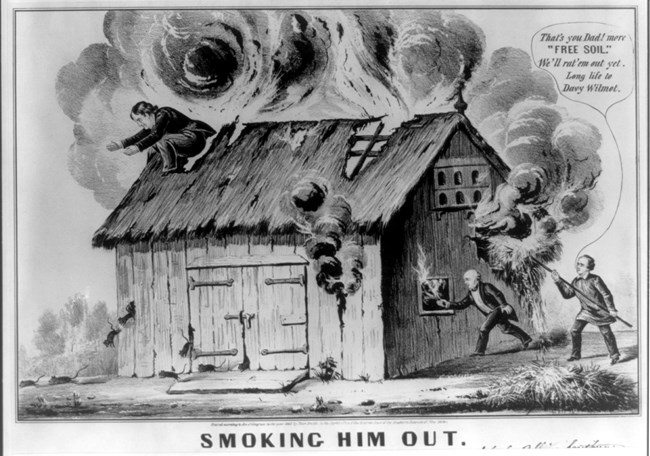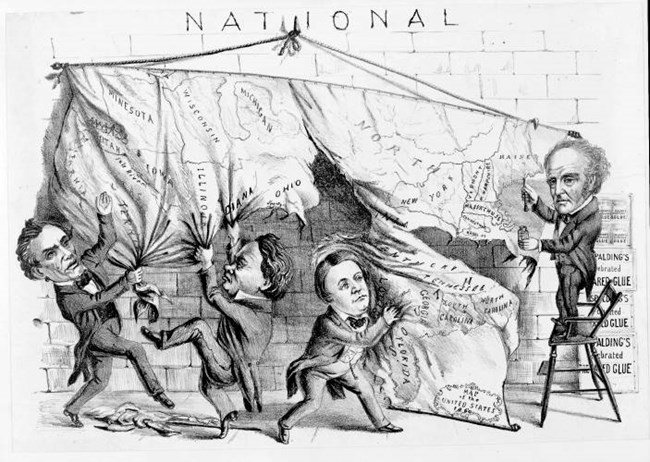
Library of Congress The Hunkers and the BarnburnersThe Election of 1848 was the final time that Martin Van Buren would try to gain public office. It was a landmark election where, by vote count, Van Buren inarguably had the worst performance of any of his bids for the White House, and yet the election of 1848 was arguably the most important race Van Buren ever ran.In the previous election of 1844, Van Buren had been denied his Democratic Party’s nomination by a faction of Southern Democrats due to his stance against the annexation of Texas, and thus his stance against the extension of slave territory. After this defeat, his intention to retire seemed genuine, but due to a revolt in New York’s state politics, he would be drawn back onto the national stage. A feud broke out between two different factions of New York’s Democratic Party, known as the Hunkers and the Barnburners. This split had been foreshadowed for some time and was something that Van Buren had actively spoken out against over the years. The split began over purely state issues, the spending of money to dig new canals being a major point of contention, but over the years, the two factions became increasingly opposed over issues of national significance. In 1844, many major Barnburner figures, such as Samuel Tilden and Azariah Flagg, came out against the annexation of Texas just as Van Buren did, and this made the factional split take on a whole new level of significance. The Barnburner faction became increasingly defined by the fact that it was against the expansion of slavery into new territories, and in the run up to the 1848 election, the two factions found that they could not reconcile their positions. In 1847, the Barnburners decided to host their own nominating convention to decide on candidates for the coming election, abandoning the official state Democratic convention to the Hunkers. The Barnburners, importantly, were not abolitionists in their policy. Instead, they were in line with growing national sentiment against the expansion of slavery. They were in favor, for example, of the Wilmot Proviso, which would have banned slavery from all of the new territory acquired during the Mexican-American War. Despite the position of the party not being abolitionist, however, those leading the growing faction made the decision to make the faction into a national party and to welcome abolitionists into their ranks. The end result was a faction that contained people with a wide array of political objectives and beliefs. Some believed that slavery should be curtailed simply because the South had too much political authority, but on the other end of the spectrum were ardent abolitionists who believed that slavery was a moral evil. All of these divergent positions came together because many of them realized that this coalition was the best chance they had of any antislavery action taking place. The resulting party would be known as the Free Soil Party. Free Soil Party BeginsThe main Democratic ticket nominated Lewis Cass, a Senator from Michigan who supported popular sovereignty, a policy where each territory would decide whether slavery was legal. The Whig candidate was Zachary Taylor, a war hero who had served in no prior political office and had much more vague political beliefs. Into this two-way fight would arrive Martin Van Buren as the candidate of the Free Soil party, but how did he come to be involved in the Free Soil campaign? A major factor was simply that Van Buren already knew many of those involved. His son, John Van Buren, was one of the main organizers of the party. Yet, Van Buren was also quite wary of how seemingly radical some of those in the Free Soil fold were. He had, in essence, spent the previous twenty years of his career trying to keep slavery out of politics as much as possible, but in joining the Free Soilers he was joining a group that would place slavery back at the center of the national debate. The theories as to why Van Buren agreed to be the Free Soil candidate are many, and we don’t know for sure why he decided to join them. Some historians argue that Van Buren simply wanted to defeat Cass and have revenge on the Democratic party for snubbing him in the previous election cycle. Others argue that Van Buren was just trying to assist his son John’s own burgeoning political career. The interpretation that has seemingly won out recently is that Van Buren simply feared that the growing influence of slavery in politics would tear the country apart, and so he sought to end its expansion but allow it to continue to exist where it already did as a form of "compromise". Regardless of his reason for being nominated by the Free Soil Party as their presidential candidate, Van Buren accepted. He would receive endorsements from surprising quarters, including from Fredrick Douglass, but he would not win the election. Van Buren ended with 10% of the national popular vote, which was the best third-party run in U.S. history up until that point, but that would not be enough to place him back in the White House. Instead, this third-party challenge would be a major factor in ensuring that Zachary Taylor, and not Lewis Cass, would be the next President of the United States. 
Library of Congress |
Last updated: September 18, 2022
